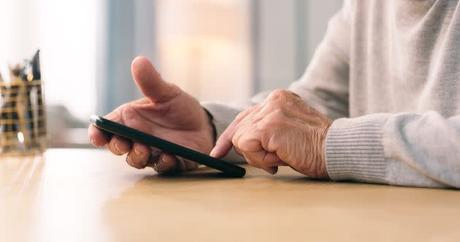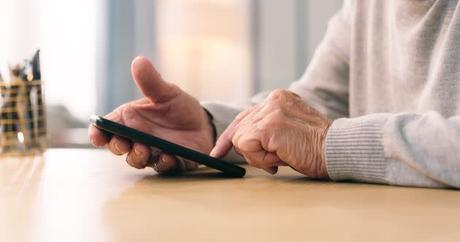
Your phone is meant to hold your attention, which makes it very difficult to spend less time on it.
Raise your hand if you've ever uttered the phrase "I want to spend less time on my phone" or made a New Year's resolution around this goal - and then failed to do so.
If you find it's a challenge (really, really challenging) to reduce your phone use, know that it's not because you lack willpower. "It's hard to change your phone usage habits because our phones are deliberately designed to hack our brains and make it difficult to break away from them," Catherine Price, the author of "How To Break Up With Your Phone and the Substack newsletter How to Feel Alive, told HuffPost via email.
Additionally, research shows that our incoming text messages and social media notifications cause a dopamine hit, triggering the feel-good sensors in our brains. In addition, cell phone addiction is another reality for some people that can lead to consequences such as stress, anxiety and depression.
Suffice to say, spending less time on your phone isn't as simple as just putting your phone down or turning it off. Jenny Wise Black, a certified marriage and family therapist and host of the podcast "Lose the Phone," said you should give yourself props for actually wanting to spend less time on your phone.
"It's actually very, very encouraging to me that people even have that resolution because it implies that there is some kind of belief that things can be better," Black said. If you find yourself worrying about your screen time, focus on being aware and empowered enough to make a change. "That's not the case for everyone," Black said.
Beyond that realization, there are some definitive ways to reduce your phone usage. Here's how to do it:
1. Think about your 'why'.
If you're one of the many people who've made a New Year's resolution involving cutting back on screen time but find yourself wavering, don't get discouraged.
The story continues
"Keep in mind that willpower alone is a terrible way to change a habit," Price said. Instead, she recommends that you come up with a positive goal to focus on.
"In other words, instead of trying to limit your phone use because you think you 'should,' ask yourself where you want to spend your time and attention," Price said.
You can also think of this as your "why," explains Jami Dumler, a licensed clinical social worker and director of a regional clinic at Pennsylvania-based Thriveworks. "When we often talk about being on our phones less often, that's not ultimately what it's really about; there's usually another driver behind that factor." Maybe you want to spend less time on your phone because you want to be a more present parent or get a promotion at work.
Then identify how your phone is interfering with your priorities and determine what you can do to make it easier to focus on those things, Price says. So if your priority is reading new books but you find yourself scrolling social media instead, take your phone out of your bedroom and leave a book on your bedside table instead, she suggested .
"A fun way to identify your goals and brainstorm ideas is to write a breakup letter for your phone," says Price. "The goal is to transform your phone from a temptation you try to resist to an obstacle that stands in your way you want to live your life... With this positive framework in mind, it will be a lot easier to change your habits,"
2. Enable the grayscale setting of your phone.
One science-backed way to make your phone less interesting is to enable the grayscale feature; this is an option that most smartphones have that turns the colors on your phone to grayscale.
On iPhones, you can enable grayscale by going to Settings > Accessibility > Display & Text Size > Color Filters. Here you enable color filters and select grayscale from the options. On Android, go to Settings > Accessibility > Color & Motion > Color Correction and select grayscale from the options.
"We know that the bright colors and movements on a screen hit our dopamine receptors, similar to other addictive properties like drugs, alcohol and things like that, and so when there are less bright colors there isn't as big of a dopamine high. ', said Dumler. "So then it's less addictive and we're less likely to get lost in the scrolling."
In fact, a 2022 study found that those who had the grayscale setting enabled were less tempted to pick up their phone compared to those who didn't use this tool, Dumler added.
Likewise, when your phone has the grayscale setting enabled, "you start seeing color in your real life and you start seeing everything on your phone. [as] black and white - it mentally places something in different places in your brain," Black noted. This is like watching a black and white movie: your brain categorizes that movie as old.
3. Put your phone on silent.
The sound of incoming text messages and emails is hard to ignore. At least they make your brain want to to answer your phone.
"We know from science and research that the sound of a notification when your phone is loud hits your brain and our dopamine receptors in the same way as a drug or substance. It's so addictive," Dumler said. "So if you have your phone on loud and you have notifications, the minute you see that screen light up or hear that little thing, we become addicted to it and we immediately have to stop what we're doing and check it. ."
Putting your phone on silent and even turning off push notifications can be extremely helpful to prevent this.


Try enabling the grayscale setting on your smartphone to make picking up your phone less appealing.
4. Put a barrier between you and your phone.
Emma Mahony, a therapist at A Better Life Therapy in Philadelphia and creator of mental health content on TikTok, previously told HuffPost that she puts a hair tie on her phone to curb her phone use.
It's hard to scroll social media, text or surf the web when there's an actual headband or rubber band on your phone - "it creates a kind of mindfulness," Mahony said.
Many people mindlessly pick up their phone, almost as a reflex when standing in line at the store or during a commercial break. This tip brings a sense of awareness to our phone use and reminds our brains that we are currently on the phone, Mahony said.
5. Move your phone away from your body.
When something is constantly within your field of vision, it's only natural to want to reach for it. To combat this, Black said it's important to get your phone out of your body and out of your visual line. That means from your hand, from your pockets or from the table in front of you.
You can try leaving your phone upstairs or in the kitchen drawer while you watch a movie with your family. This isn't easy, so if it takes a few tries, that's okay.
What we are experiencing now with our phones "is actually separation anxiety. So if you're experiencing separation anxiety - if you're an adult, even if you're a child - related to a particular relationship in your life, that's something we worked on in therapy," Black said. "None of us think anything about the levels of separation anxiety we experience from our phones."
6. Organize your apps intentionally.
If you always open your TikTok app or your Pinterest app, it might be a good idea to make those things a little less accessible to ease the temptation.
You can keep an app running while adding a few extra steps (or in this case, clicks) to use it, Dumler advised. This may mean placing it in a folder or on one of the subsequent screens following the main home screen.
To do this, Dumler suggests that you delete your frequently used apps from your home screen. How to do this depends on your phone, but it's another simple Google search to find out how (if you don't already know).
This means it is not directly accessible and you are less likely to open the app.
7. Or consider deleting your social media apps completely.
You probably spend hours mindlessly scrolling through the latest updates on Instagram. A natural way to spend much less time on your phone? Delete your social media apps.
"Take all social media off your phone, anything that helps you pass the time, turn off your phone," Black said.
If you still need to use social media for work, to stay in touch with others or just like to check it out, you can still use it, but Black suggested only using social media on your computer if you go this route.
"For a reason we don't really understand, when someone sits on their laptop or computer and looks at social media, it doesn't have the same impact on their social media. [mental health]," Black said.
Black added that social media impacts everyone differently, but it is known to cause anxiety, can trap people in a negative cycle of comparison based on what they see online and can lead to depression.
8. If you're really committed, consider getting a second 'dumb phone'.
"I get a lot of criticism for this, but I'm not going to stop because I really feel like this is the hope of our society. I think everyone should start experimenting with a second phone," Black said.
In other words, buy a cheap, non-smartphone to take with you instead of your smartphone. This teaches you how to depend on a phone that doesn't have all the features found on a standard smartphone, while still having the necessary qualities (like calling or texting) you need, Black explains. You can try this for just an hour a day to start and go from there.
You can certainly give up your smartphone altogether, but you don't have to.
"I think it's also important to emphasize that phones aren't all bad. They're useful, they can be a great resource for looking things up easily, or having that calculator handy when you're shopping, and a great way to connect with people," Dumler said.
But it's important to remember that balance is everything here. If you find that you can't leave your phone in the other room without feeling uncomfortable or that you're constantly ignoring your partner because of incoming notifications, it could be a sign that something is wrong.
"If you get out of balance and your phone takes over a lot of other areas, [being on your phone less] can be a great goal for you," Dumler said.
